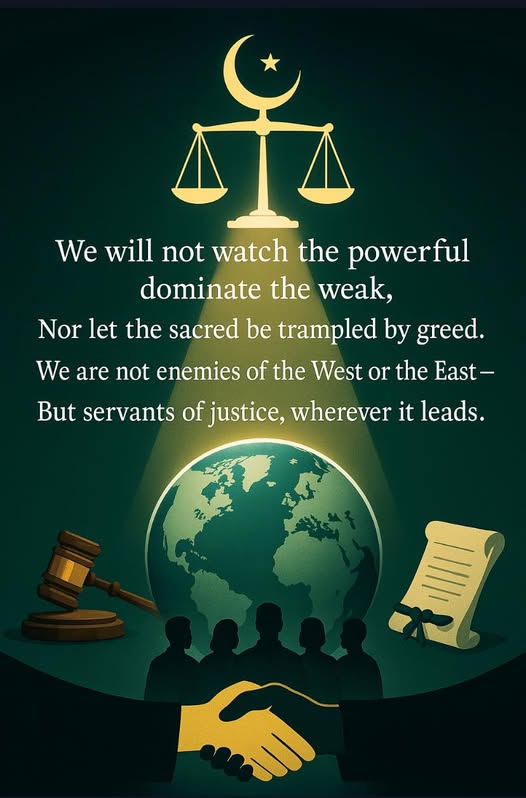
The Middle Nation (Ummatan Wasatan), as described in the Qur’an, holds a sacred responsibility not only to uphold justice within itself but to bear witness to truth on behalf of all humanity (Qur’an 2:143). This role naturally extends to engaging with global institutions like the United Nations, which, despite its flaws, remains one of the few platforms where global consensus and accountability are negotiated.
Here’s how the Middle Nation can assist in reforming the UN to advance universal justice and peace:
1. Reclaiming the Role of Moral Witness
Qur’anic Principle:
“…so that you may be witnesses over mankind…” (2:143)
Muslims nations must act as ethical beacons in international arenas. This means:
Highlighting double standards (e.g., in how wars or human rights violations are condemned or ignored).
Advocating for equal application of international law—whether for powerful states or weak ones.
Calling out selective humanitarianism, where justice is offered to some and denied to others.
Being a witness is not about taking sides with blocs or empires—it is about consistently standing for the truth, even if it is against one’s own allies.
2. Advocating for Structural Reform in the UN
The Muslim world must collectively push for institutional reform at the UN, guided by the principles of justice (‘adl) and consultation (shura).
Key reforms include:
-Abolishing or reforming the veto system in the Security Council, which currently allows five nations to block the collective will of the world.
-Promoting equitable representation of nations in leadership roles within UN bodies, especially from the Global South.
-Creating mechanisms to hold all nations accountable, including powerful ones, for war crimes, economic exploitation, and environmental destruction.
The Middle Nation can use its numbers (over 50 Muslim-majority countries) and moral clarity to lead a global coalition calling for a more just UN system.
3. Promoting an Ethical Narrative Against Materialism and Militarism
Modern geopolitics is often driven by greed, arms trade, resource plunder, and ideological domination. The middle nation must challenge this narrative:
-By presenting a God-centered worldview that values life, dignity, and stewardship of the Earth.
-By promoting nonviolence, justice-based diplomacy, and decolonial justice for nations still suffering from imperial legacies.
-By investing in education, media, and diplomacy that reclaims Islam’s voice in shaping the global moral compass.
4. Modeling Justice Within
Before the Middle Nation can reform others, it must reform itself.
-Muslim nations must uphold human rights, ensure justice for minorities, and resist authoritarianism.
-They must eradicate corruption, honor international commitments, and protect freedom of speech and conscience.
A nation cannot call others to justice while harboring injustice within.
5. Transform and Revise the charter of the OIC
Explicitly embed the Ummatan Wasatan concept, the duty of Shahada (witnessing), and universal Adl (justice) as the core objectives and guiding principles of the organization.
-Establish an Independent “Office of the Witness” :
- Mandate: To impartially monitor, document, and report on major violations of international law, human rights, and humanitarian law globally (conflicts, persecution, war crimes, crimes against humanity, genocide, systemic injustice). Observing, documenting, and testifying to injustice everywhere.
- Composition: Staffed by renowned international jurists, human rights experts, Islamic scholars specializing in ethics and international relations, and investigators, appointed based on merit and integrity, not nationality. Requires guaranteed independence from member state pressure.
- Powers: Automatic mandate to investigate situations based on credible evidence; power to request information from all states; ability to deploy rapid documentation teams; public reporting to the OIC Council of Foreign Ministers (CFM), UN bodies, and the global public.
- Reform Decision-Making (Mitigating the Veto/Consensus Problem): Introduce qualified majority voting (e.g., 2/3 or 3/4) for resolutions on human rights, accountability, and conflict situations, especially when involving member states.
– Operationalizing the “Witness” Role Globally:
- Universal ICC Support: Campaign collectively for universal ratification of the Rome Statute among OIC members and globally. Provide consistent political and logistical support to the ICC, even in investigations involving powerful states or allies.
- Extending the OIC into a true “Middle Nation” organization is not merely a rebranding exercise. It demands a profound paradigm shift – from an organization often seen as defensive and reactive to one that is proactive, principled, and universally oriented. By establishing robust independent mechanisms for witnessing and accountability, reforming decision-making, leading global justice initiatives, practicing rigorous internal accountability, and building broad coalitions, the OIC can aspire to embody the Quranic ideal.
Conclusion: From Protest to Proposal
The Middle Nation must move from reaction to construction, from protest to proposal. Its mission is not merely to critique the UN but to reimagine it—as a true platform for human dignity, equality, and global conscience.
The transformation of the OIC would make it a uniquely powerful force for reforming the international system, including the UN, towards genuine universal justice and accountability, fulfilling its divinely inspired mandate to be “witnesses over humanity.” It is an ambitious but essential undertaking for the conscience of the world and the future of global justice.
Let this be the voice of the Middle Nation:
“We will not watch the powerful dominate the weak,
Nor let the sacred be trampled by greed.
We are not enemies of the West or the East—
But servants of justice, wherever it leads.”

